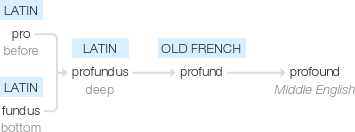Profound
Middle English: from Old French profund, from Latin profundus ‘deep’, from Latin pro ‘before’ + fundus ‘bottom’. The word was used earliest in the sense ‘showing deep insight’.
wiktionary
From Middle English profound, from Anglo-Norman profound, from Old French profont, from Latin profundus, from pro + fundus(“bottom; foundation”).
etymonline
profound (adj.)
c. 1300, "characterized by intellectual depth, very learned," from Old French profont, profund (12c., Modern French profond) and directly from Latin profundus "deep, bottomless, vast," also "obscure; profound; immoderate," from pro "forth" (from PIE root *per- (1) "forward") + fundus "bottom" (see fund (n.)).
The literal and figurative senses both were in Latin, but English, having already deep, has employed this word primarily in its figurative sense; however in 15c. it was used of deep lakes or wounds. Sense of "deeply felt, intense" is from c. 1400. Related: Profoundly. A verb profound "to penetrate, reach inside, saturate, fill" is attested in English from 15c.-17c.
